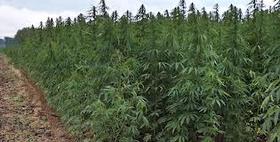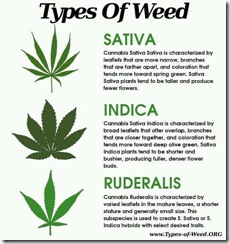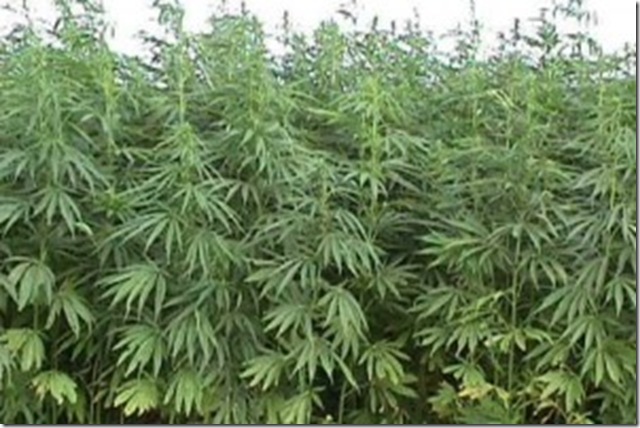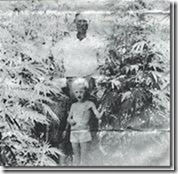Published: January 20, 2013
By BRUCE SCHREINER — Associated Press
LOUISVILLE, Ky. — Industrial hemp’s repositioning toward mainstream status gained ground with a timely endorsement from the Kentucky Chamber of Commerce. But the plant’s proponents have more work to do in cultivating support to legalize a crop that once was a Bluegrass state staple.

The chamber said recently that provided there’s adequate regulatory oversight, it supports legislation to position Kentucky as a leader in the production and commercialization of industrial hemp. The position was hailed by hemp backers, noting the chamber’s political clout.
"When Kentucky’s leading voice for small businesses and economic development endorses a piece of legislation, lawmakers sit up and listen," said state Agriculture Commissioner James Comer, a former state lawmaker.
Comer is leading the comeback campaign for the versatile crop outlawed for decades due to its association with its cousin, marijuana. Hemp has a negligible content of THC, the psychoactive compound that gives marijuana users a high.
Comer, a farmer himself, touts hemp’s potential while crisscrossing the state, saying Kentucky can become a hub of hemp production and manufacturing. The crop can be turned into paper, clothing, food, biofuel, lotions and other products.
"We could be the Silicon Valley of industrial hemp manufacturing right here in Kentucky," Comer said recently.
Bills aimed at legalizing the crop have been introduced in the Kentucky House and Senate, and lawmakers are expected to debate the issue when they return to the State Capitol in Frankfort next month to resume the 2013 session.
But hemp backers acknowledge challenges remain, namely resistance from Kentucky State Police. And that opposition could have a spillover effect with lawmakers hesitant to oppose the state’s top law enforcement agency.
State Police Commissioner Rodney Brewer last month restated the agency’s opposition, saying law enforcement may have difficulty distinguishing between hemp and marijuana.
Comer met with Brewer following a meeting of the Kentucky Industrial Hemp Commission late last year, but the commissioner said they’ve had no follow-up discussions. Comer said he’d like to have state police support but sees the agency’s resistance as a "non-factor."
"I was a state representative for 11 years and very few bills ever passed without somebody being opposed to them," he said.
Republican Sen. Paul Hornback of Shelbyville, lead sponsor of one of the hemp bills, said state police opposition will be an obstacle. But he said the state chamber’s support for legalizing the crop helps reshape the crop’s image.
"Everybody has to feel comfortable with the bill," said Hornback, a tobacco farmer who once was lukewarm to hemp. "With the stature that the state chamber has, I think it does legitimize it. It brings credibility to the issue."
Supporters say there’s a ready-made market for hemp, pointing to industry estimates that U.S. retail sales of hemp products exceed $400 million. Hemp is grown legally in Canada and many other countries, and imports into the U.S. include finished hemp products.
At least a couple of Kentucky companies – a tobacco processor and a seed supplier – have expressed interest in branching out into hemp. Hemp supporters say that could lead to jobs, especially in rural areas.
But the resistance of state police could be a sticking point for some lawmakers, including the top House leader.
"It will be difficult to pass any legislation that doesn’t have the support of the Kentucky State Police and Kentucky’s law enforcement community," said House Speaker Greg Stumbo, D-Prestonsburg. "As long as they have reservations, I have reservations."
Another potentially key player in the debate, Rep. Tom McKee, D-Cynthiana, said the biggest impediments to hemp’s comeback are the federal ban on hemp and the concerns of state police.
But McKee, chairman of the House Agriculture and Small Business Committee, hasn’t yet staked out a position on the issue.
"We don’t want to close a door on any viable agricultural crop that is profitable and would be well-accepted," he said.
Under Hornback’s bill, hemp growers would need licenses, and applicants would have to pass criminal background checks.
U.S. Sen. Rand Paul said he would seek a waiver from the federal ban on hemp for Kentucky if state lawmakers vote to legalize the crop. Paul also has pushed for federal legislation to remove restrictions on hemp cultivation. The Kentucky Republican said hemp supporters need to persuade law enforcement skeptics that the crop "won’t make the drug problem worse."
"We live in a modern world where we have GPS," he said in a recent speech in Frankfort. "Couldn’t a farmer or anybody who wants to grow it just get a simple one-page permit and say these are my GPS coordinates where it’s being grown and it could be checked?"
As for Comer, the agriculture commissioner has said he won’t defy the federal government on the issue.
The crop hasn’t been grown in the U.S. since the 1950s. Kentucky once was a leading producer of industrial hemp. During World War II, the U.S. government encouraged farmers to grow hemp for the war effort because other industrial fibers, often imported from overseas, were in short supply.
Because it can thrive in small, sloping plots, Comer said hemp could be a viable crop on marginal land in central and eastern Kentucky.
"A decade from now, someone will look back and think, ‘You mean there were people opposed to growing industrial hemp?’" he said.
Read more here: http://www.kentucky.com/2013/01/20/2483327/hemp-supporters-gain-big-endorsement.html#storylink=cpy












